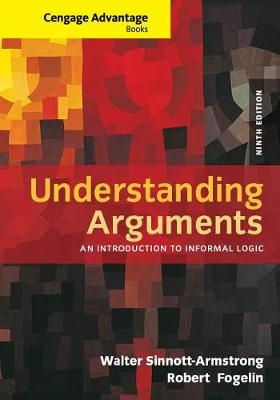
Cengage Advantage Books: Understanding Arguments
Wadsworth Publishing Co Inc (Verlag)
978-1-285-19736-4 (ISBN)
ADVANGEBOOKS - UNDERSTANDING ARGUMENTS: AN INTRODUCTION TO INFORMAL LOGIC, 9E shows readers how to construct arguments in everyday life, using everyday language. In addition, this easy-to-read textbook also devotes three chapters to the formal aspects of logic including forms of argument, as well as propositional, categorical, and quantificational logic. Plus, this edition helps readers apply informal logic to legal, moral, scientific, religious, and philosophical scenarios, too.
Robert J. Fogelin is Professor of Philosophy and Sherman Fairchild Professor in the Humanities at Dartmouth College. Walter Sinnott-Armstrong is Chauncey Stillman Professor of Practical Ethics in the Department of Philosophy and the Kenan Institute for Ethics at Duke University.
Preface.
PART I: HOW TO ANALYZE ARGUMENTS.
1. Uses of Arguments.
What Arguments Are. Justifications. Explanations. Combinations: An Example.
2. The Web of Language.
Language and Convention. Linguistic Acts. Speech Acts. Performatives. Kinds of Speech Acts. Conversational Acts. Conversational Rules. Conversational Implication. Violating Conversational Rules. Rhetorical Devices. Deception. Bronston v. United States. Summary.
3. The Language of Argument.
Argument Markers. If . . . , then. Arguments in Standard Form. Some Standards for Evaluating Arguments. Validity. Truth. Soundness. A Tricky Case. A Problem and Some Solutions. Assuring. Guarding. Discounting. Evaluative Language. Spin Doctoring.
4. The Art Of Close Analysis.
An Extended Example. Clerk Hire Allowance, House of Representatives.
5. Deep Analysis.
Getting Down to Basics. Clarifying Crucial Terms. Dissecting the Argument. Arranging Subarguments. Suppressed Premises. Contingent Facts. Linguistic Principles. Evaluative Suppressed Premises. Uses and Abuses of Suppressed Premises. The Method of Reconstruction. Digging Deeper. An Example of Deep Analysis: Capital Punishment.
PART II: HOW TO EVALUATE ARGUMENTS: DEDUCTIVE STANDARDS.
6. Propositional Logic.
The Formal Analysis of Arguments. Basic Propositional Connectives. Conjunction. Disjunction. Negation. Process of Elimination. How Truth-Functional Connectives Work. Testing for Validity. Some Further Connectives. Conditionals. Truth Tables for Conditionals. Logical Language and Everyday Language. Other Conditionals in Ordinary Language.
7. Categorical Logic.
Beyond Propositional Logic. Categorical Propositions. The Four Basic Categorical Forms. Translation into the Basic Categorical Forms. Contradictories. Existential Commitment. Validity for Categorical Arguments. Categorical Immediate Inferences. The Theory of the Syllogism. Appendix: The Classical Theory. The Classical Square of Opposition. The Classical Theory of Immediate Inference. The Classical Theory of Syllogisms.
PART III: HOW TO EVALUATE ARGUMENTS: INDUCTIVE STANDARDS.
8. Arguments To And From Generalizations.
Induction versus Deduction. Statistical Generalizations. Should We Accept the Premises? Is the Sample Large Enough? Is the Sample Biased? Is the Result Biased in Some Other Way? Statistical Applications.
9. Causal Reasoning.
Reasoning About Causes. Sufficient Conditions and Necessary Conditions. The Sufficient Condition Test. The Necessary Condition Test. The Joint Test. Rigorous Testing. Reaching Positive Conclusions. Applying These Methods to Find Causes. Normality. Background Assumptions. A Detailed Example. Calling Things Causes. Concomitant Variation.
10. Inference To The Best Explanation And From Analogy.
Inferences to the Best Explanation. Arguments from Analogy.
11. CHANCES.
Some Fallacies of Probability. The Gambler's Fallacy. Strange Things Happen. Heuristics. The Language of Probability. A Priori Probability. Some Rules of Probability. Bayes's Theorem.
12. CHOICES.
Expected Monetary Value. Expected Overall Value. Decisions Under Ignorance.
PART IV: FALLACIES.
13. Fallacies Of Vagueness.
Uses of Unclarity. Vagueness. Heaps. Slippery Slopes. Conceptual Slippery-Slope Arguments. Fairness Slippery-Slope Arguments. Causal Slippery-Slope Arguments.
14. Fallacies Of Ambiguity.
Ambiguity. Equivocation. Definitions.
15. Fallacies Of Relevance.
Relevance. Ad Hominem Arguments. Appeals to Authority. More Fallacies of Relevance.
16. Fallacies Of Vacuity.
Circularity. Begging the Question. Self-Sealers.
17. Refutation.
What Is Refutation? Counterexamples. Reductio Ad Absurdum. Straw Men and False Dichotomies. Refutation by Parallel Reasoning.
PART V: AREAS OF ARGUMENTATION.
18. Legal Reasoning.
Components of Legal Reasoning. Questions of Fact. Questions of Law. The Law of Discrimination. The Equal Protection Clause. Applying the Equal Protection Clause. The Strict Scrutiny Test. The Bakke Case. Regents of the University of California v. Bakke. Legal Developments Since Bakke. Grutter v. Bollinger. Gratz v. Bollinger. Burden of Proof.
19. Moral Reasoning.
Moral Disagreements. The Problem of Abortion. The Pro-Life" Argument. "Pro-Choice" Responses. Analogical Reasoning in Ethics. Weighing Factors. "A Defense of Abortion," by Judith Jarvis Thomson. "An Argument that Abortion Is Wrong," by Don Marquis.
20. Scientific Reasoning.
Standard Science. Scientific Revolutions. "Molecular Machines: Experimental Support for the
Design Inference," by Michael J. Behe. "Living with Darwin," by Philip Kitcher.
21. Religious Reasoning.
"Five Reasons to Believe in God," by William Lane Craig. "Seven Deadly Objections to Belief in the Christian God," by Edwin Curley.
22. Philosophical Reasoning.
"Computing Machinery and Intelligence," by A. M. Turing. "The Myth of the Computer," by John R. Searle.
Credits.
Index."
| Verlagsort | Belmont, CA |
|---|---|
| Sprache | englisch |
| Maße | 157 x 236 mm |
| Gewicht | 657 g |
| Themenwelt | Schulbuch / Wörterbuch ► Wörterbuch / Fremdsprachen |
| Geisteswissenschaften ► Philosophie ► Logik | |
| Sozialwissenschaften ► Pädagogik | |
| ISBN-10 | 1-285-19736-4 / 1285197364 |
| ISBN-13 | 978-1-285-19736-4 / 9781285197364 |
| Zustand | Neuware |
| Haben Sie eine Frage zum Produkt? |
aus dem Bereich


